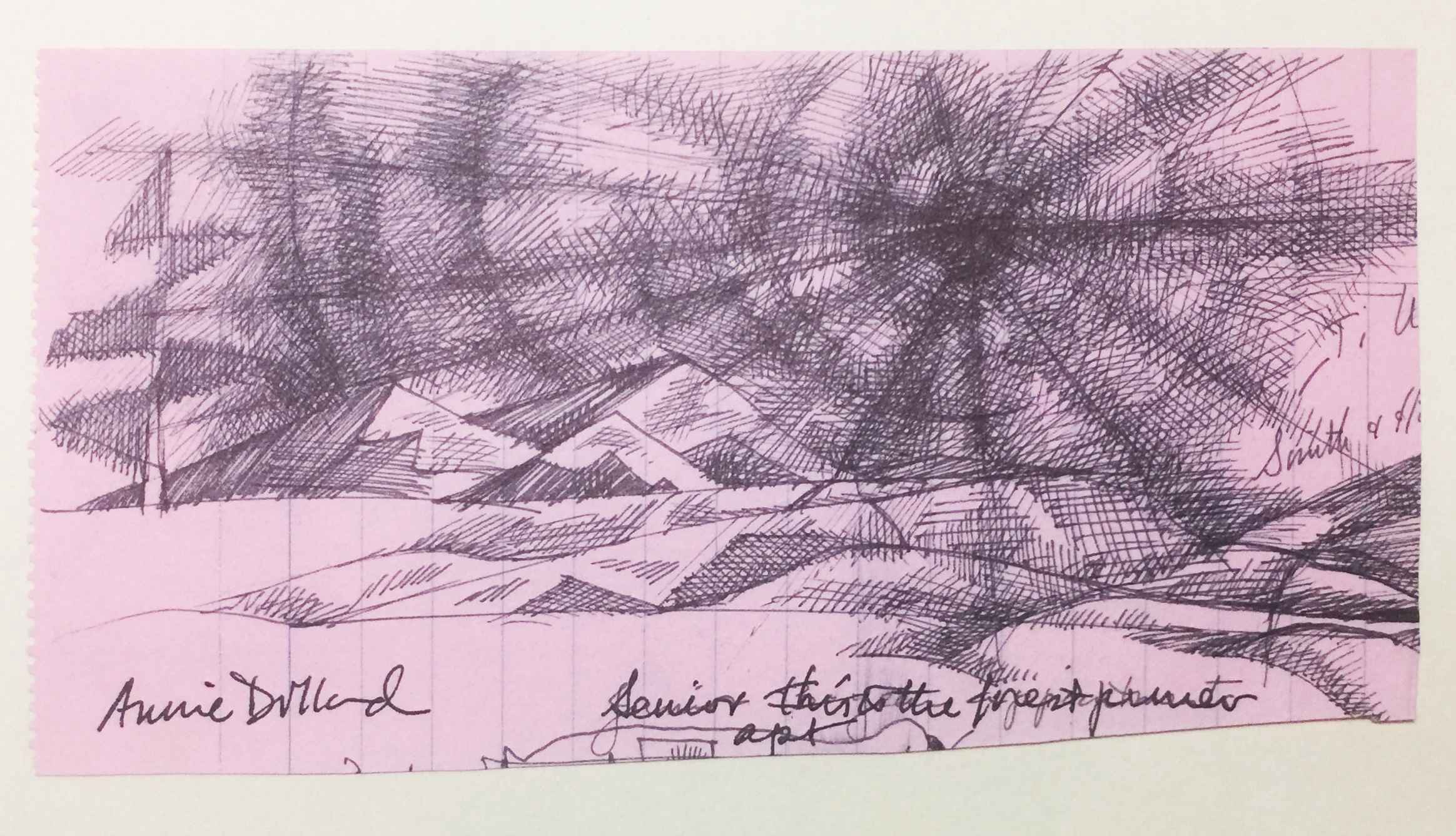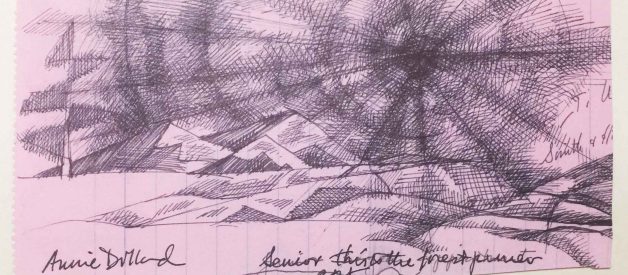?The writer of any first person work must decide two obvious questions: what to put in and what to leave out.? ? Annie Dillard
 Annie Dillard doodle contributed for Dandy Yankee Doodle Project. Photo by the author.
Annie Dillard doodle contributed for Dandy Yankee Doodle Project. Photo by the author.
I believe the Annie Dillard quote above comes from her book Pilgrim at Tinker Creek. She was referring to her own memoir writing if I remember correctly, and to all memoir writing in general. This was before the era of blogs and blogging.
Blogging has become an interesting phenomenon, a natural outgrowth of the world wide web. It?s popular because it is easy. And with all the various platforms today, it?s accessible to nearly anyone.
I remember when people were criticizing email because it was ?destroying language? and wrecking good grammar, good English etc. Then texting came along and academics began to gasp.
Has texting destroyed the language? Everything has a pro and con, including email, texting and blogging. I think it?s great that people are communicating. How many letters would people send in a day if they had to type, print, fold, and insert into an envelope that they must still address and stamp? What a hassle. By email, I can maintain contacts with fifty or more people a day. At the office it used to be a hundred or more.
Email is easy, and nearly anyone can do it.
Blogging, likewise, is a heckuva lot easier than building a website. There are hordes of blog platforms that will host your creative output. Some have gotten a lot of bad press, but maybe it?s because the Press is jealous. I wouldn?t doubt that more people read blogs than read newspapers.
In the mid-nineties I built a website, in part for the experience and in part for the forum where I could display some of my work. I used a software program that was limited in capabilities but easy to use. Ease of use was key.
But even so, most people did not have sufficient motivation to get past the web-weaving learning curve. And although businesses everywhere were soon building websites ? almost as necessary as business cards and storefront signage ? individuals with a website were probably fewer in number.
Blogs changed all that. Blogs opened new possibilities for self-expression that seemed infinite in scope. Ev Williams, who co-founded Blogger and later Twitter (from which he just now stepped down to give yet more attention to his new child, Medium) has been truly on the forefront in this arena. Kudos to Ev Williams
What I wanted to address here is not the feared destruction of our language. I?m more concerned about the line between appropriate self-revelation and TMI. (Too Much Information.) I don?t want to be guilty of making too many rules, but I do see this as a problem area. Just as the issue of boundaries has increasingly become a problem in recent years, how much disclosure is prudent?
For example, when an employee has a problem with the boss, what is gained by posting a 500-word rant? I once heard about such an account. What the employee gained was a two week suspension without pay. That, I thought, was pretty generous.
Many people have no sense of boundaries with other facets of their lives. I remember being in a chat room in which a woman was upstairs complaining (online, publicly, with strangers) about her husband downstairs in front of the television.
I do not believe blogs are intended to be a replacement for journals. In your journal you can do self-analysis and personal psychological assessments. But do you really need to announce to the world your every neurotic tendency, self-destructive fantasies, anguished self-accusations, prideful declarations or hypersensitive assessments of others? Guess what? There are some things we do not need to know. Work it out in private.
Personally, I would even be careful in a journal with some information. I myself have needed to vent on issues once in a while, but would later tear out the page and destroy it because it could hurt someone I cared about. We definitely need a space for total self-honesty, but that should be a private space, too, shouldn?t it?
I really liked what Mark Twain did when he wrote his autobiography. He wanted to produce something in which he could be totally honest, but he also wanted to not hurt people who were in still in his life. He chose Full Disclosure, but would not permit the book to be published for 100 years. All the main people in the book would be long dead.
When I first began blogging, a lot of what I wrote began with excerpts from my private journals. I remained selective, using ideas and thoughts as a springboard to additional conversation with my readers.
In short, your journal is for you, your blog is for your readers. Or at least that?s how I see it. Feel free to make your own rules, but that?s how I see it.
In the meantime, blog on.
NOTE: The doodle from Annie Dillard at the top of this page was sent to me as part of my Dandy Yankee Doodles Project. More about that during another space in time.
Get to know more about Annie Dillard at www.anniedillard.comYou can find a collection of quotes for writers at my own website: ennyman.com/writing
Originally published at pioneerproductions.blogspot.com


